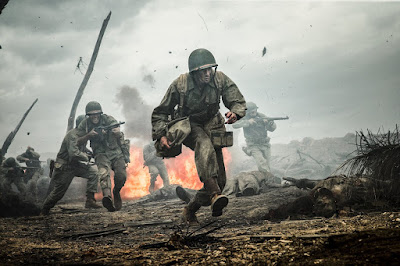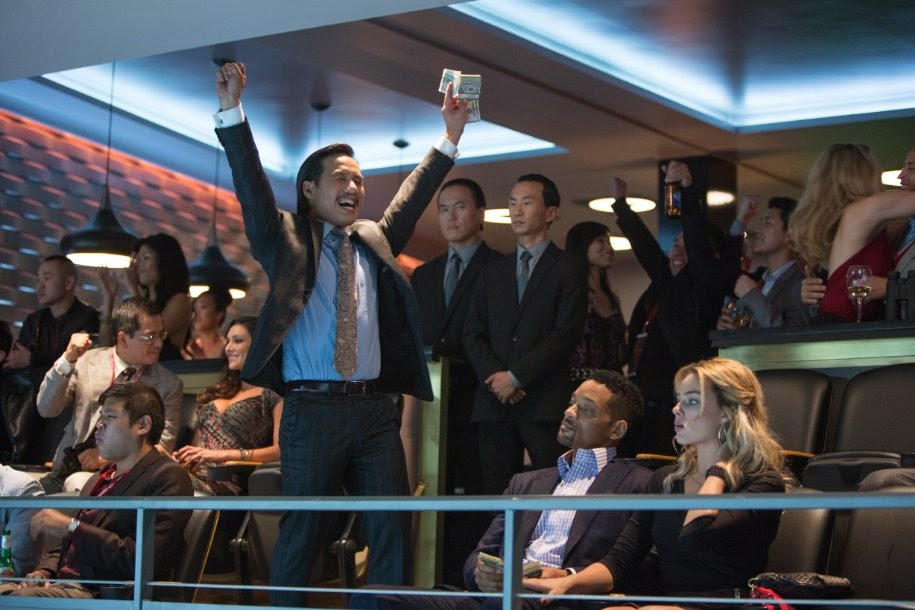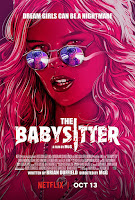Hacksaw Ridge
Hacksaw Ridge
(2016)
Directed by: Mel GibsonWritten by: Robert Schnekkan &
Andrew Knight
Starring: Andrew Garfield, Vince Vaughn
Hugo Weaving and Sam Worthington
Rating: R
Release Date: November 4th, 2016
 |
| Andrew Garfield runs through hell on Earth in Hacksaw Ridge Image Source |
Seemingly blacklisted, (and honestly, deservedly so), Gibson seemed to go off the deep end by publicly ranting about conspiracy theories, while driving drunk around Hollywood nearly ten years ago. Yet, (and don't get me wrong, I'm not saying he's not a jerk for doing so), he has gotten more flak than anyone for what seems more like an episode of bipolar mania than an actual racist belief, (or something as crass and backwards as Billy Crystal's clueless embodiment of a racist caricature). Gibson himself has even acknowledged that he suffers from manic depression. While it doesn't let him off the hook for his past words and actions, it sure does put in perspective why he continually seems to publicly shoot himself in the foot. I also see it as grossly hypocritical of the industry in Hollywood to lambast Gibson continually, but never talk about the crimes of Roman Polanski, the damning allegations about Woody Allen, or the alleged child abuse that supposedly runs rampant in the industry, with famed child-actor Ellijah Wood stating to the New York Times, “Clearly something major was going on in Hollywood [...] it was all organized [...] there are a lot of vipers in this industry, people who only have their own interests in mind. There is darkness in the underbelly.” I'm not saying Gibson is a saint, or that he should be forgiven. But he has admitted wrongdoing, something not very many people with wealth and power ever do, sought out treatment, and continues to do so.
There's lots of interesting opinions and good articles about the validity of Gibson's "comeback," but in the warped-world of Hollywood, I think he's a broken man, who has confessed his sins publicly and see no reason as to why he should be continually blacklisted, (judging by his appearance at the Oscars this year, I think we can safely assume that his blacklisting is over). I think the 'liberal elite' have bigger fish to fry, (as I've outlined above), than some idiotic rant a drunk, manic bipolar man went on a decade ago. Now that we've got that out of the way, it's time to get to the meat of the matter: Hacksaw Ridge.
Hacksaw Ridge follows the young Desmond Doss; son to a poor, rural American mother and father, (the latter of which fought in the first World War), Doss lives a solitary life which sees him fighting with his brother by day, and getting whipped by his alcoholic father by night. His father, (Hugo Weaving), is a shell of a man, haunted by the shell-shock of the Great War, and the loss of his closest friends. When one of his fights with his brother goes awry, Doss sees himself as the villain of Cain and Able, nearly killing his brother, and vows never to be violent again. Additionally, seeing how the Great War psychologically destroyed his father, the oft-philosophical Doss realizes that War is no joke, and assuredly, no walk in the park. However, seeing the tyranny of Hitler's fascism spread across Europe, and the brutality of the Japanese attack on Pearl Harbour leaves Doss between a rock and a hard place; he want's to do something to push back against the Japanese and Germans, but doesn't want to give up his principles, the very thing the Japanese and Germans are attacking, to do so. His answer? Become a medic.
What follows is likely the most brilliant script Gibson has ever put his effort behind. Having seen Apocalypto, Braveheart, and The Passion of the Christ, I was expecting two and a half hours of exhausting and exploitative violence. In the past, it has seemed like Gibson uses fake blood on film the way Pollock used paint on canvas. With Hacksaw, Gibson thankfully shows restraint, only using shocking, brutal and grotesque visuals in a few key scenes to showcase the darkest depths of human indecency. The visuals are key to Hacksaw Ridge's success.
From climbing a rope ladder up to a battlefield with blood dripping down on soldiers like rain, to a camera panning backwards through the viscera of Japanese and American soldiers in hand to hand combat, to a PTSD flashback-like jump shot of a wounded soldier screaming in surprise, the cinematography is not only technically brilliant, but adds a layer of verisimilitude to the experience. The sound editing, design, lighting and makeup all work together seamlessly, (and seemingly invisibly), at times to create a riveting film; one of the few films in recent memory where all of the elements, (especially sound design), work in unison to create a harrowing, immersive cinematic experience. The acting too, by the increasingly outstanding Andrew Garfield, (who disappears into his role), the chameleon-like Hugo Weaving, and the underrated Vince Vaughn, lend credence to a almost unbelievable* story of heroism. It's masterful filmmaking, from all ends.
Mel Gibson, for all his shortcomings, (literally and figuratively), is an exceptional filmmaker. His only downfall in his most recent films has been the excessive religious overtones. Here, Gibson finally finds a comfortable balance between showcasing how he uses his faith positively without alienating a larger, non-Catholic, audience. In Hacksaw Ridge, Gibson uses religion as metaphor, not just regurgitation, and not as gospel; opening up a story all audiences can relate to, instead of the blood, guts and exploitative gore that was The Passion of the Christ, (I seriously doubt that any decent religious person would think The Passion was a good thing - I can't see the reason why audiences needed literally three pages from the bible made into a 127 minute snuff film), we have the heroic story of a man who stood up for his principles and saved hundreds of lives without taking one. Additionally, Doss wasn't preachy - he stood for his principles, and respected those who had theirs, within the scope of the great american melting pot, something people from both sides of todays political climate could take note of.
Although Doss was deeply religious, and his experience unique, there's a lot to take from his story for people who don't immediately identify with his worldview. What if the US government was a little more open to acceptance and alternative methods of warfare or negotiation? Yes, every nation needs an army that can fight for it's values, and the order of command is important when military strategy has to be decided and executed within seconds. However, if a few more voices like Doss' were allowed to have a free and open voice within the American melting pot, maybe, all of us, not just Americans, would end up saving lives instead of taking them. Gibson's film merely suggests at these questions, and doesn't offer too many answers. It only showcases a passionate man rising heroically to the occasion, a man willing to give his life for his ideals and, more importantly, his fellow man.
GRANT'S RATING: 5/5 STARS
Andrew Garfield & Vince Vaughn in Hacksaw Ridge: "Rescue"
*Doss truly was a hero of unmatched proportions; People magazine reports that although Doss 'officially saved' 75 soldiers during battle, "The always modest Doss reckoned he saved about 50, but his fellow soldiers gauged it closer to 100. They decided to split the difference." He won the United States' Medal of Honor without ever firing a shot.



Comments